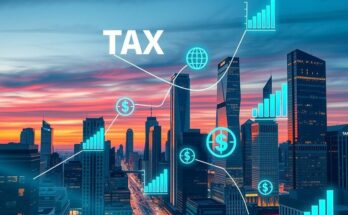South Africa’s finance minister presented a revised budget proposing a one-percentage-point increase in VAT, which met with immediate criticism from the Democratic Alliance. The budget allocates over one trillion rands for essential improvements in infrastructure but faces opposition regarding tax hikes and economic strategy amid a struggling economy.
In a recent parliamentary session in Cape Town, Finance Minister Enoch Godongwana presented a revised budget that included a smaller increase in the value-added tax (VAT) compared to previous proposals. This revised budget was unveiled three weeks after the original version was unexpectedly withheld due to its unpopular two-percentage-point VAT hike, which faced widespread opposition.
The new proposal suggests a one-percentage-point VAT increase, raising it to 16 percent by the 2026/27 financial year. This increment will be implemented in two phases: a 0.5-point increase in 2025/26, followed by another 0.5-point rise in the subsequent year, according to Godongwana. However, the proposal was met with disapproval, as several parliamentarians booed the Minister during his announcement.
The Democratic Alliance (DA), a significant party within South Africa’s coalition government, promptly declared its opposition to the revised budget. DA leader John Steenhuisen emphasized the party’s commitment to advocating for economic growth and job creation, indicating discontent with the proposed measures.
In light of inflation reaching 3.2 percent in January, Godongwana stated that the government does not anticipate implementing inflation-indexed increases to personal income tax brackets to support its spending plans. He noted that increasing corporate or personal income tax rates could lead to diminished revenue and a detrimental impact on investment and economic growth. Despite this, he acknowledged that VAT disproportionately affects all citizens.
South Africa, recognized as the most industrialized nation on the continent, grapples with significant economic challenges, including an unemployment rate exceeding 32 percent, notably impacting the youth. The nation suffers from stark inequalities, a remnant of its historical context of white-minority rule, with the World Bank estimating that approximately two-thirds of the population lives in poverty.
The economy grew by a mere 0.6 percent in 2024, constrained by deteriorating infrastructure and recurrent power outages attributed to mismanagement and corruption. Godongwana indicated that the government faces urgent service delivery needs critical for achieving developmental objectives, which cannot be deferred further.
The proposed budget outlines over one trillion rands (approximately $54.4 billion) in expenditures over a three-year span, focusing on enhancing transport, energy delivery, and water sanitation projects. It also allocates funds to strengthen the tax service’s capacity to improve revenue collection, as billions remain uncollected.
The DA criticized the budget for potentially impoverishing the citizens of South Africa and jeopardizing the government’s future, accusing the African National Congress (ANC) of ignoring warnings regarding tax increases. They stated they would not support Godongwana’s budget, jeopardizing its chances of securing the crucial parliamentary majority it requires for approval.
In summary, South Africa’s revised budget proposal, put forth by Finance Minister Enoch Godongwana, has encountered immediate opposition, highlighting the contentious economic landscape of the nation. The proposed VAT increase, albeit smaller than previous suggestions, has been met with disapproval from key political figures, including the Democratic Alliance. The budget outlines significant spending plans aimed at improving infrastructure but faces skepticism regarding the government’s approach to taxation and economic growth amidst high levels of unemployment and inequality.
Original Source: www.france24.com




